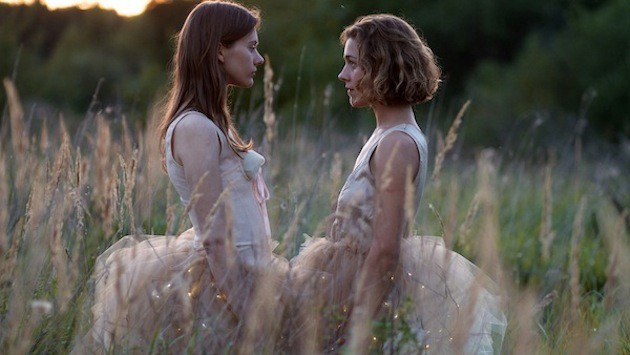Born in Lithuania, Alanté Kavaïté studied Beaux Arts in Avignon and in Paris, where she specialized in photography and video. Her first feature film, Ecoute le Temps (Fissures), was released in 2007. (Press materials)
The Summer of Sangaile will premiere at the 2015 Sundance Film Festival on January 22.
W&H: Please give us your description of the film playing.
AK: Seventeen-year-old Sangaile is fascinated by stunt planes. She meets a girl her age at a summer aeronautical show near her parents’ lakeside villa. Sangaile allows Auste to discover her most intimate secret and finds in her teenage love the only person to truly encourage her flying.
W&H: What drew you to this story?
AK: A few years ago, I conducted several film workshops for teenagers. I thoroughly enjoyed working with them, and above all, I enjoyed filming them. At seventeen, on the cusp of adulthood, everything seems possible. I was greatly inspired by the open-minded and intense way in which the teenagers embraced things and expressed themselves. I was captivated by how spontaneous, free, and ingenious they were.
This experience brought back feelings from my adolescence. When I was seventeen, like most teenagers, I was in a hurry to make choices, all the while being filled with doubt and fear. I wrote the story for The Summer of Sangaile with the guiding idea that sometimes it only takes a chance encounter with someone who helps you see yourself in a different light to overcome certain difficulties. I wanted this kind and caring individual to be another young girl of the same age, but whose personality was diametrically opposed to Sangaile’s in order to bring out her flaws and contradictions.
From the writing stage, I had envisioned a film that would be bright and light, even if the movie addresses adolescent unrest and self-destructive behavior. Talking about adolescence, I wanted to make a very musical film that was also a love story with a sensorial, sensual dimension and which had a strong emotional impact. Setting aside the issue of gender while highlighting the symmetry of bodies seemed indispensable in order to focus on the narrative of human beings in the making, which is at the heart of this story.
I spent my adolescence in Lithuania, a country with a special, practically obsessive relationship with aviation. Every summer, like everyone, I went to see a great number of air shows. It seemed to me that this popular Lithuanian pastime would be the perfect metaphor for Sangaile. Aerobatics, an extreme sport, requires true self-control, and that is just the thing that Sangaile seems to lack the most. She has to struggle to free herself and achieve her dream.
Finally, the film shows — in a visual and allusive manner to stay within the adolescent point of view — the gap that separates Lithuanian youth born in a democratic country from their parents, who were raised under a totalitarian regime. Without any solid points of reference, this [new generation of] youth has to find its own answers to questions presented by today’s world. But I’m hopeful for this generation.
W&H: What was the biggest challenge in making the film?
AK: My main concern was finding the perfect actresses, but we were lucky and found Julija [Steponaityte] and Aisté [Dirziute] very quickly. However, my biggest challenge was shooting spectacular stunt planes under a short schedule and budget constraints.
W&H: What do you want people to think about when they are leaving the theatre?
AK: I want my audience to leave the theatre with positive emotions through this sensorial journey in the world of precious and fragile teenage beauty. And also the idea that the difficulties that we have to go through help us reveal who we really are.
W&H: What advice do you have for other female directors?
AK: I don’t really consider myself a female director, and I don’t want to do so for other women. Female directors are just directors.
W&H: What’s the biggest misconception about you and your work?
AK: The biggest misconception may be about my birth country, Lithuania, due to the lack of knowledge about it, but also probably because some strong lobbies work against European construction. There is a huge difference between what I hear from the French media, for example, and what I know about this country and its people.
About my work, my first film, Écoute le Temps (Fissures), was positioned by distributors as a thriller because they thought that it would sell more easily. But it was surely a mistake, as that kind of viewer did not take the bait, and it drew away its potential core audience, those whom I met in festivals and in various Q&As who seem to appreciate that particular kind of cross-over arthouse film.
W&H: How did you get your film funded? Share some insights into how you got the film made.
AK: It is certainly not a studio movie, and European cinema does not rely very much on crowdfunding yet. It was mainly funded through the national and European support system, as it qualifies as a Lithuanian, French and Dutch production.
More specifically, The Summer of Sangaile was developed in France, where I live, with the support of the Media Programme of the European Union. Through our Lithuanian partner, we received our main support from the new Lithuanian Film Center. We were then able to apply for the Eurimages fund. We also had some money from the Sofica Cofinova (a kind of French tax shelter), thanks to the active presence of Films Distribution. We also received some support from the Netherlands Film Fund. The rest comes mainly from equity from my French producer and some deferrals, including mine.







